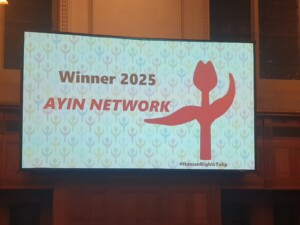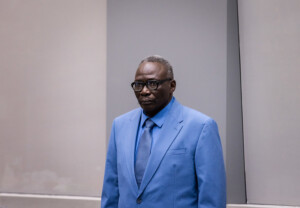‘Free those held arbitrarily in Sudan, investigate abuses’: HRW
“Sudanese authorities should stop arresting people because of their real or perceived political views, release everyone arbitrarily detained, drop unfounded charges, and investigate allegations of detainee abuse”, according to Human Rights Watch (HRW).
In a news release today, HRW points to the dozens of opposition party members, students, and political activists detained by agents of the National Intelligence and Security Service (NISS) in the lead up to, during, and after the national election of 13-16 April.
On the morning of 2 April, security officers detained a member of the Sudanese Congress Party (SCP) in Sinja, Sennar state, because she was campaigning against the election.
“Sudanese authorities should stop arresting people because of their real or perceived political views, release everyone arbitrarily detained, drop unfounded charges, and investigate allegations of detainee abuse”, according to Human Rights Watch (HRW).
In a news release today, HRW points to the dozens of opposition party members, students, and political activists detained by agents of the National Intelligence and Security Service (NISS) in the lead up to, during, and after the national election of 13-16 April.
On the morning of 2 April, security officers detained a member of the Sudanese Congress Party (SCP) in Sinja, Sennar state, because she was campaigning against the election.
She told HRW that the men tied her up, and beat her for several hours while insulting her. They then released her in a remote area. Her injuries were so severe, she had to be hospitalised. NISS officials also warned her not to report what happened to her.
The African Centre for Justice and Peace Studies stated on 17 April, a day after the polling stations closed, that 22 people were detained on 12 April alone. Sudanese monitoring groups reported dozens of additional detentions.
Dr Sandra Kadouda, a prominent political and human rights activist, was taken from her car by a group of armed men whom she suspected of being NISS officers, as she drove to an anti-elections event at the National Umma Party headquarters in Omdurman on 12 April. After being held for three days at an unknown location, she was freed, “visibly bruised and with injuries to her shoulder”.
NISS denied responsibility for Kadouda’s arrest, and sought to cover up information about the case. Authorities have in recent days charged her with defamation and spreading false information, and detained family members, HRW states. On 20 April, NISS officials censored a newspaper article in El Sudani newspaper about her detention.
“Instead of allowing people to express their views peacefully, the government is snatching up political activists and beating, torturing, and jailing them, without the slightest pretence of respect for basic rights.”
NISS agents detained Dr Jalal Mustafa, Chairman of the Committee of Solidarity with Victims of the September Demonstrations, in Khartoum on 20 April. Mustafa was held after he spoke out publicly against the detentions. He remains in NISS custody.
In Lagawa, West Kordofan, heavily armed security forces detained a sultan, a lawyer, and a student on 21 April, because they supported an independent candidate, witnesses told HRW. The three men remain in detention without charge, under the authority of the state governor.
Detentions continue
On Sunday, the National Election commission announced the re-election of President Omar Al Bashir. Detentions, however, “often by NISS agents”, are continuing.
On 28 April, security officers detained at least three activists speaking out against the election, including Mastour Ahmed Mohamed, Political Secretary of the opposition Sudanese Congress Party (SCP).
“Instead of allowing people to express their views peacefully, the government is snatching up political activists and beating, torturing, and jailing them, without the slightest pretence of respect for basic rights,” Daniel Bekele, HRW Africa director said.
“The best way for the ruling party to celebrate the election is to end the crackdown on political dissent.”
Mistreatment
The NISS has broad powers and can detain people for up to four-and-a-half months without judicial oversight. The agency is widely known for abusive treatment of detainees. In recent weeks, released detainees and other credible sources have confirmed that NISS agents or men in civilian clothing suspected of working with the NISS severely beat detainees and warned them not to report the beatings.
In Khartoum, a lawyer detained in his office by security agents on 12 April, told HRW that he had been blindfolded and beaten with pipes, and could barely move because of his injuries. “My body is broken,” he said by telephone on 20 April. He and four other men detained with him, all ethnic Nuba, were released on 15 April.
On 19 April, a group of security officials and pro-government students abducted and beat a student leader at Khartoum University. The attackers blindfolded the student leader, tied his hands, and took him to the NISS offices near the Shendi bus station in Khartoum North. They beat him with batons for several hours and interrogated him about his links to opposition political parties. He was released, after being warned not to report what had happened.
Charges
Many of the detainees face serious charges, HRW says, including for crimes that carry the death penalty.
Among those facing serious charges, HRW states, is Adil Bakheet, a well-known human rights defender and member of the Sudanese Congress Party, who was detained on 16 April.
NISS officers interrogated him about a training he had conducted with an organisation called Tracks for Training and Human Development. They charged him with offenses against the state, punishable by death. He remains in detention.
NISS had raided the Tracks office on 26 March, accusing the participants of promoting the election boycott. The security agency has repeatedly summoned and harassed Tracks’ staff and managers.
Three SCP members detained on 11 April in El Duweim, White Nile state, also face charges of crimes punishable by death, including undermining the constitutional system. They were transferred to Khartoum, where they remain in detention, while lawyers or their relatives have not been allowed to visit them.
“The best way for the ruling party to celebrate the election is to end the crackdown on political dissent,” Bekele said.
“The Sudanese government needs to put a stop to the raids, detentions, trumped-up charges, and harsh beatings. [It] should investigate allegations of mistreatment, and hold the responsible officers to account.”











 and then
and then